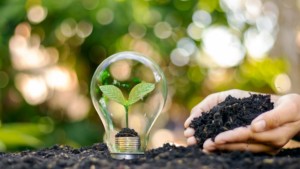
The same is true of small changes. One of the best ways to help the environment is to look for ways to save energy in our daily lives. It’s easier than you think. And Earth Day is a perfect time. Here are a few steps you can take right now:
Cover Pots While Cooking
When you heat water on the stove, it slowly turns into vapor. In uncovered pots, the vapor escapes, along with the energy used to heat it. Placing a lid over the pot keeps the heat trapped inside and helps cook your food faster.
Keep Your Oven Door Shut
Whether you’re baking or broiling, it’s always tempting to take a peek inside and see how your food is coming along. However, opening the oven door releases the heat needed to prepare your food. By some estimates, even a few seconds is enough to lower the temperature by 25°F. In order to get back to the set temperature, the oven winds up consuming even more energy.
Use Your Microwave More Often
Heating food in your microwave uses a fraction of the energy as a regular oven ‒ around 80 percent less. It also takes less time. Think a microwave’s only for frozen dinners? Potatoes, nachos, quesadillas, bacon, broccoli, corn on the cob, English muffins, and macaroni and cheese can all be prepared in a microwave. You’d be amazed at how versatile it is.
Mix Food By Hand
People have been making cookies, scrambled eggs, and all sorts of recipes long before mixers and food processors were invented. Appliances like these save time but use a lot of energy. Some meals might still require them. Most of the time, however, a little elbow grease works just as well.
Open Up Your Windows
When temperatures climb, your first instinct is probably to switch on your air conditioner. But you can stay cool without it, at least through a large part of the day. Opening windows lets heat escape. Opening two creates a cross breeze, which draws cool air in. It’s a cost-effective way to cool off, especially in the morning and evening, when temperatures are relatively low outside.
Keep Curtains & Blinds Closed
People in some parts of the country never require air conditioning, even during the summer. Most of us aren’t so lucky. We’ll need to run our AC eventually, but in order to minimize environmental costs, we should make sure we get the most out of it.
Air conditioners work best in closed environments away from heat sources, such as stoves or ovens. (Regulating temperatures in your kitchen is notoriously difficult.) However, the sun is the biggest heat source you have to deal with. Closing your curtains and blinds prevents them from interfering with your air conditioner.
Switch to Cold Water
Water heaters consume a lot of energy. While it’s nice to have hot water, we don’t need it as often as we think. For instance, washing your clothes in warm water isn’t necessary. Cold water gets them just as clean.
Likewise, warm water isn’t more hygienic than cold water. It isn’t nearly hot enough to kill germs. Soap does that. If you’re really brave, you could consider taking cold showers as well. Even setting the tap to lukewarm reduces your energy consumption.
Unplug Energy Vampires
Some devices continue to draw electricity even after they’ve been switched off. These “energy vampires,” which include your smartphones, computer tablets, gaming consoles, DVD players, and smart TVs, as well as cable and satellite boxes don’t draw much electricity individually but together they account for around 20 percent of your energy use.
Take Care of Your Car
Cars aren’t great for the environment, but there’s a lot you can do to minimize their impact. Regular maintenance keeps your motor working at maximum efficiency, so it consumes less gas and emits less exhaust.
Drive Sensibly
Fuel mileage peaks at 50-60 miles an hour. Any faster and you start burning extra fuel to overcome drag. Any slower and you shift to a lower gear, which uses more fuel. Stick to the speed limit on the highway. A steady pace is better for the environment.